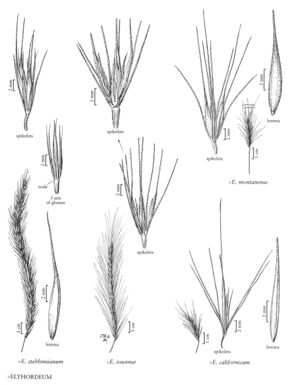Difference between revisions of "×elyhordeum iowense"
FNA>Volume Importer |
imported>Volume Importer |
||
| (2 intermediate revisions by the same user not shown) | |||
| Line 38: | Line 38: | ||
|publication year= | |publication year= | ||
|special status= | |special status= | ||
| − | |source xml=https:// | + | |source xml=https://bitbucket.org/aafc-mbb/fna-data-curation/src/200273ad09963decb8fc72550212de541d86569d/coarse_grained_fna_xml/V24/V24_411.xml |
|subfamily=Poaceae subfam. Pooideae | |subfamily=Poaceae subfam. Pooideae | ||
|tribe=Poaceae tribe Triticeae | |tribe=Poaceae tribe Triticeae | ||
Latest revision as of 16:23, 11 May 2021
Culms 40-80 cm, erect. Sheaths hirsute; ligules about 0.3 mm; auricles short, acute; blades 6-8 mm wide, adaxial surfaces shortly velutinous. Inflorescences spikelike, 9-12 cm long, 5-10 mm wide, flexuous, with 3 spikelets per node. Spikelets with 2 florets, the lateral spikelets usually shortly pedicellate, the central spikelet sessile. Glumes about 2.5 cm, not indurate at the base; lemmas 6-8 mm, puberulent, awns 25-35 mm; anthers 1.6-1.8 mm, indehiscent in the lowest florets of each spikelet. 2n = 28.
Distribution
Iowa, Mont., N.Dak., Nebr.
Discussion
×Elyhordeum iowense is a hybrid between Elymus villosus and Hordeum jubatum that has been found at scattered locations in the central plains. It probably occurs elsewhere, but is unlikely to be common, because E. villosus usually grows in more shady locations than H. jubatum.
Selected References
None.
